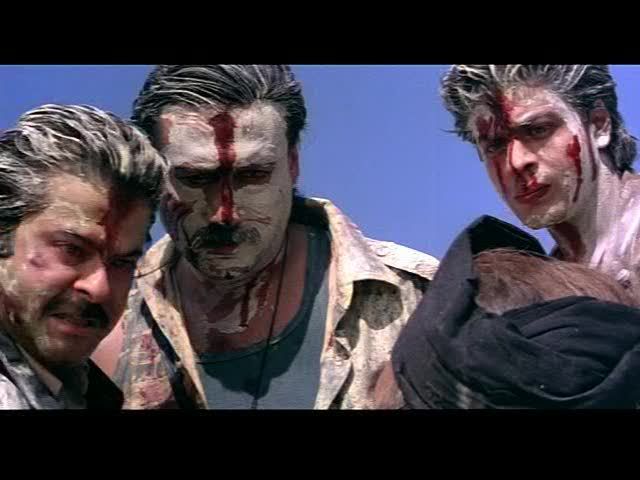
"Trimurti" also means "three statues" - and, look, the "destroyer" brother, "preserver" brother and "creator" brother have been caked in clay and adorned in the markings of the temple divinities! Hmm, subtle!
The epic flop Trimurti (a Hindu concept "in which the cosmic functions of creation, maintenance, and destruction are personified by the forms of Brahmā the creator, Viṣṇu the maintainer or preserver, and Śiva the destroyer or transformer") is good for a number of laughs, some epic pulpy spirit and the usual "awww!"-inducing glorification of brotherly love. Don't go into it expecting Subhash Ghai's usual masala fireworks, as you'll just be disappointed. The narrative is clunky, you could lose a Pinto in the plot holes, and the few sparks of life are quickly doused in pure badness. That said, if we at the PPCC were in the habit of grading films, we would give this a C. It's not good, but it doesn't FAIL as spectacularly as some other films.
The entire narrative relies on the stupidity of Saeed Jaffrey's character, Uncle, and the quasi-funny, quasi-melodramatic love between young Romi (Shah Rukh Khan) and Radha (Anjali Jathar). But wait - we should start at the beginning. Back in the day, there was a bad-ass female (!) police officer named Satyadevi (Priya Tendulkar). Satydevi's arch-nemesis was the kooky Kooka Singh (Mohan Agashe), who, apart from his wild fashion sense and facial tics, annoyed Satyadevi by being violently territorial over for the local Kali shrine. The Satyadevi/Kooka face-off escalates to increasingly grisly heights - he kills her husband, she kills his son - and Kooka eventually wins this round by framing Satyadevi and having her sent to jail. While in jail, Satyadevi gives birth to her third son, Romi, and, rather than placing him in the care of her brother, who we'll call Uncle Bumbling Idiot (Saeed Jaffrey), she tells him to give the baby to her prepubescent sons, Shakti and Anand. "Tell them they must raise their little brother!" she says.
Now, this may sound outrageous, but you'll see that Uncle Bumbling Idiot really is a bumbling idiot, and you wouldn't want him raising your children either. In particular, his most egregious idiocy and the one thing that drives the whole story forward: He forgets to tell the kids about Kooka Singh, the villain of the film! This would have saved everyone a lot of grief.
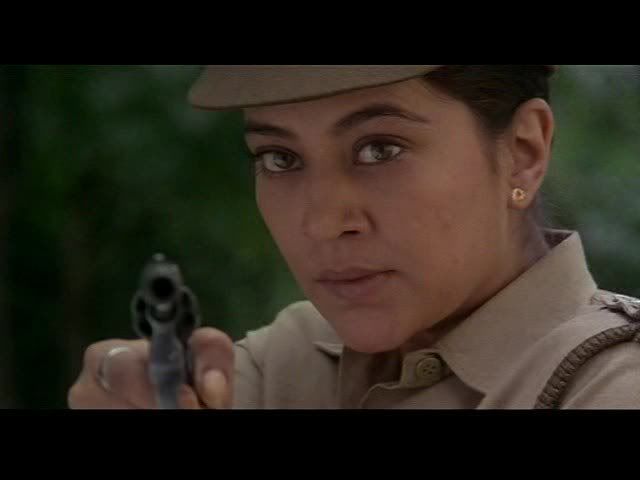
Strong, martial women - YES!
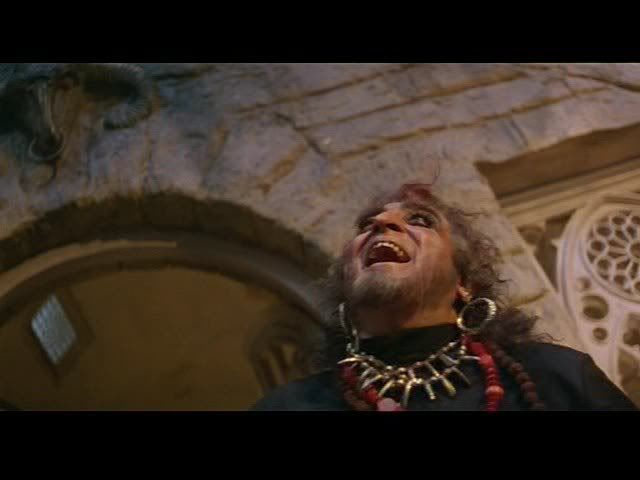
Mohan Agashe hams it up as the monstrous, ridiculous Kooka. Man, we last saw Mohan kicking it in the excellent Mississippi Masala. This was certainly a change.
Anyway, the little boys do what they can with their new little brother but eventually, as parents are wont to do, they disagree over how he should be raised. The eldest Shakti insists that their little brother follow the straight-and-narrow path: working hard, earning little and keeping his moral principles intact. The middle brother, Anand, instead thinks that they should get right down to opening liquor joints and selling cocaine as that's the only way to get ahead in the big, bad world. After one final argument, Anand storms out, moves to Mumbai and reinvents himself as Sikandar (Alexander/"conqueror"), the foster son of a low-level gangster (Satyendra Kapoor). Anand is, like, eight years old or something. Clearly a total bad-ass! (And guess who he grows up into? Yessss.)
Fast-forward to the present. Shakti (Jackie Shroff) is a now a poor, hardworking truck driver for the military. Little Romi (Shah Rukh Khan) has just completed his IB and is now very keen on marrying his childhood sweetheart, Radha (Anjali Jathar). Radha's family (among them, Tinnu Anand) is richer than Romi's, and so they refuse the brothers' proposal and humiliate them. An enraged Shakti flips out and breaks their Ming vase while a despairing Romi decides to abandon his brother's hard-work ethic and join the underworld in a hasty "get rich-enough-to-marry-Radha quick" scheme. And whose crime syndicate should he join but... yes, Kooka's! After a hilarious job interview in Kooka's dungeon lair, where Kooka sucks rooster bone marrow and scoots around on an office chair he's decorated in fur and horns, Romi gets the job. A few days later, at the similarly hilarious office party, Romi meets... yes, the legendary Sikandar (Anil Kapoor)! Romi and Sikandar immediately hit it off and become best friends, and it's only a matter of ninety minutes for identities to be revealed, families to be reunited and Kooka's demise via a trimurti of "land, sea and air" to come.
Honestly, if the story had been better-told, this film had the potential to be a really spectacular pulpy masala classic. Alas, the tone was often mishandled, and this made the logical inconsistencies all the more glaring. Part of the problem with tone was the mismatch between Shah Rukh Khan's performance and the performances of Anil Kapoor and Jackie Shroff. They were just on different wavelengths: Jackie and Anil playing it straight, SRK playing it... well, like mid-1990s over-the-top SRK. So much of the narrative depended on Shah Rukh Khan's character, too: it's because of his love for Radha that he joins Kooka's gang, meets Sikandar, causes Sikandar and Shakti to meet and everything to come to a climax. Furthermore, it's for Romi's love and Romi's loyalty that the older brothers fight. Should Romi follow the moral righteousness of Shakti, or the criminal rebellion of Sikandar? Yet, as we've argued before, Shah Rukh Khan has never had particularly good chemistry with his male co-stars. Since the masala genre depends so critically on believable fraternal love, SRK's failure to convince us of Romi's love for his brothers compromised the entire emotional weight of the story. Jackie Shroff and Anil Kapoor - veterans of fraternal love - were much more convincing.
The next problem with the film's tone was the hollow romance: the script couldn't decide whether Romi and Radha's relationship was lighthearted and funny, or melodramatic and intense. On this front, we can't really blame SRK: if there's one thing he is good at, it's romance.
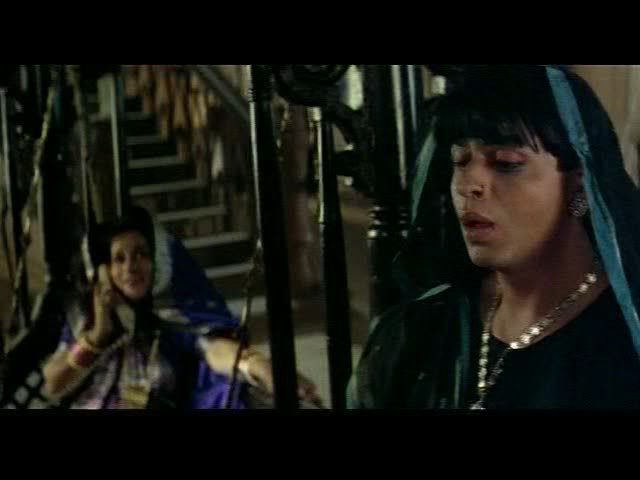
A rare opportunity to see SRK in drag! See, the romance should have just gone for comedy. It was certainly making us laugh.
Now, we bought this film for Anil Kapoor and, while not really paisa vasool for an Anil Kapoor fan (his bombastic entrance cues intermission), he is one of the film's saving graces. Anil Kapoor worked extensively with director/producer Subhash Ghai and he has a particular skill at being consistently excellent, even in Ghai's poorer efforts. As this review notes, it is only during Anil's scenes that we have any sense of emotional realism (or sweet pulpy goodness - tears! breakdowns!). Anil's scenes with SRK are also the best in the film: SRK playing the adulating and worshipful younger brother, Anil the macho elder brother with a distinctly dorky hidden side. These scenes are broadly comic, and some moments - SRK fanning himself while Anil works the Stairmaster, SRK walking in on Anil's private jam out to old Hindi film songs - were very funny and very cute.
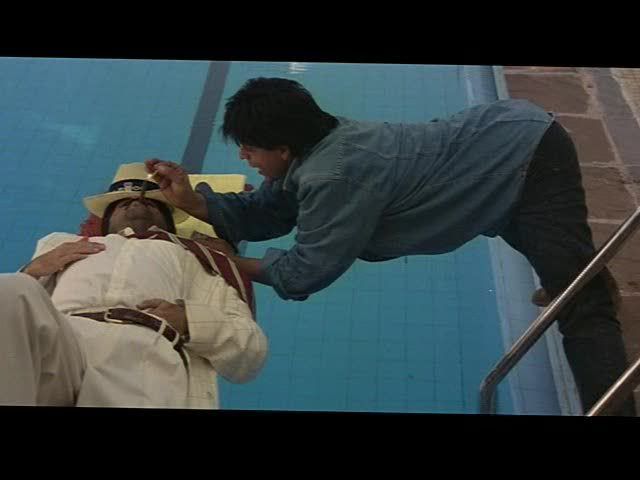
The scenes of Romi's growing devotion and love for his brother were the film's sweetest and most charming scenes.
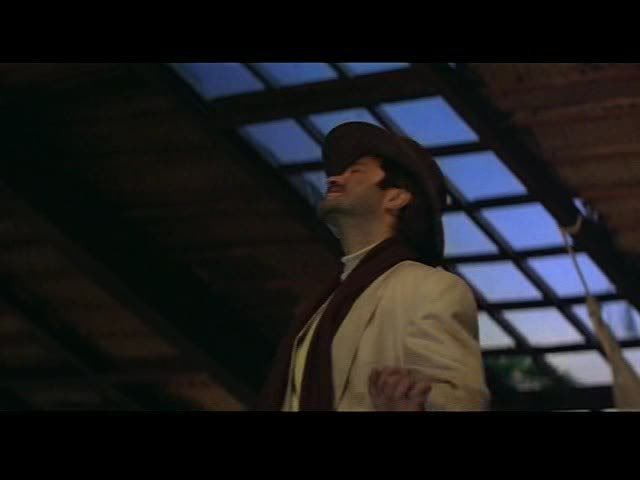
And the hard-ass Sikandar's not-so-secret dancing dorkiness was also very cute.
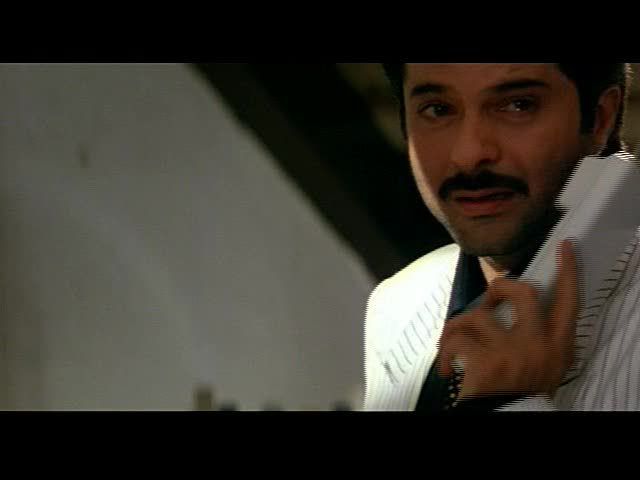
Not only dorky, but a woob as well! Oh, Anil Kapoor, don't cry. The PPCC loves you!
We at the PPCC consider ourselves very forgiving of trashy films. The one thing we cannot tolerate are trashy films with stupid, regressive messages - that combination of shoddy aesthetics and evil message-mongering is toxic for us. Trimurti is that rare case of a trashy film with an almost empowering message: the film is positively awash in feminine power, from the hardcore Satyadevi - who is more "Angry Young Lady" in the Amitabh Bachchan mode than the typical long-suffering Mom of masala films - to the constant thematic references to the goddess Kali. Even the eldest son's name, Shakti, refers to "divine, feminine power". In a genre which is rife with male-centric tales of passive, victimized women, it was very nice to see a more martial, kick-ass femininity (though it is, alas, the brothers who end up saving the day in the end... well, you can never have everything!).
Anyway, now that the review's done with, PPCC Readers in Delhi, we have a mission for you. Our current house favorite Anil Kapoor is auctioning a date with himself in Delhi (dinner and a movie!) for charity. One of you must bid in this auction, win it, and convey the PPCC's love and regards (and website address) to His Stacheliness himself. And then you must report back. Go, loyal minions!


10 comments:
One of the hyped up things in magazines about this film was Mohan Agashe's role. It was meant to turn him into the next big thing after Gulshan Grover (?) Very good coverage of this pakau film :) thanks
This was also the first time that a Subhash Ghai film failed in a long time.
this movie was utter crap, but a good waste of time though! The "very good-very bad" was my favorite anil song for a while when i was 7!
And my dad used to sing it to me as well! But SRK was horridly ott and him in drag only furthered my thinking of his closet gayness!
TCP - O rly?! I can see that - Mohan def had a very Gulshan Grover-esque look going on (those eyebrows!). Too bad it didn't catch on. I quite liked him! (Or maybe I just liked seeing him in a post-Mississippi Masala haze.)
Rum - Ha! The "very good, very bad" song had a bizarre way of being both grating and excruciatingly catchy. ARGH! Let's not talk about it anymore before it worms its way into my ear. SRK in drag was def worth it - I wish they had kept going along that tack, it was becoming really surreal and funny! Also enjoyed Romi and Radha's Doors-esque "love me one time, love me one hundred times" song. Last me all through the week - DUN DUN DUN DUN DUN!
This was such a totally, utterly bad film, and yet I still watched it all the way through.
But never again. :-)
Memsaab - You did a bit better than me then, as I had to lean on the FFWD button during the final climax. I would have turned it off about 15 min to the end, but I just wanted to make sure a certain Stacheley bro didn't bite the big one/get impaled on some trident in the final minutes. You never know - singletons, especially criminal singletons, never fare well in masala films! (Nothing to live for, after all!)
I just couldn't watch this movie after about 10 mins. Full marks to PPCC and Memsaab for sitting through the whole movie.
Utterly totally crap is the way i wud describe this movie
Your review has made me want to watch this!! (With a heavy lean on the FFW button, of course.)
I never really thought about it before, but SRK really never works in the bromance genre, does he... Maybe that is one of the reasons Kal Ho Naa Ho fell so flat - the Saif/SRK thing never really takes off. Maybe SRK with a sister would work better...
Anonymous - LOL! I'm always a little surprised about how I can drone on and on about really mediocre films! But fair point.
Filmi Girl - I would LOVE to see SRK with a gaggle of female friends. And approach this film with caution!
Reading this review reminds me of a younger & angstier SRK pouting in an interview about how Trimurti'd supposedly work out better with better direction..and here you are putting the entire blame on his shoulders.. hehe.
SRK was raised almost entirely by females from when he was 15, so when he says in interviews how he can't bond with male friends/co-stars or how his bfs are not known for being masculine, one can sympathize. He's found a way to work around the issue work-wise though..by choosing scripts with a strong female presence. The plan's worked well so far.
Trimurti failed because of its rubbish and full of potholes in the script. Otherwise it was a good masala entertainer like Ghai's early 90s flicks.
Also the role of Anand was tailor made for Sanjay Duty keeping him in mind but the date of Sanjay Duty and movie were the same.
Post a Comment